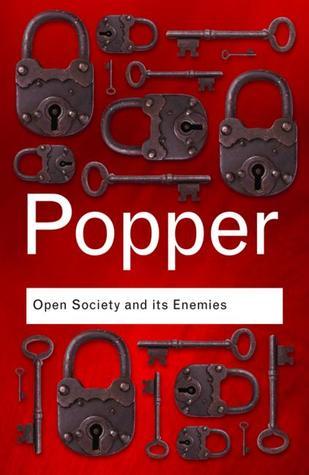What do you think?
Rate this book


801 pages, Kindle Edition
First published January 1, 1956
کتابی ارزشمند از یک فیلسوف تحلیلی با ترجمهای عالی به فارسی. کارل پوپر در این کتاب که در اثنای جنگ جهانی دوم نوشته شد به ریشهیابی دو فاجعه سیاسی در قرن بیستم پرداخته است: ۱. ظهور فاشیسم هیتلری ۲. ظهور مارکسیسم استالینی.
نویسنده ریشه این دو فاجعه را در افکار نژادپرستانه افلاطون میبیند و مفصلا در مورد فلسفه افلاطون از نظریه فرمها (ایدهها) تا نظریه شاهفیلسوف بحث میکند. نویسنده با ذکر زندگی شخصی افلاطون و به ویژه دایی او (کریتیاس) و حکومتهای مستقر در آتن پیش و در زمان زندگی افلاطون به ریشهیابی افکار به زعم نویسنده دیکتاتوری او میپردازد. پوپر با شرح کتابهای افلاطون که با رندی از شخصیت فرزانه سقراط (که توسط حکومت دموکراتیک آتن به نوشیدن شوکران محکوم شد و این را از دلایل تنفر افلاطون از دموکراسی ذکر میکند) سواستفاده میکند، نشان میدهد چگونه افلاطون در کتابهای مختلفش فاشیسم را که قرنها بعد فرصت خودنمایی پیدا کرد تئوریزه کرده است. تیغ برّان نقد پوپر بر اسطوره فلسفه غرب و قرائتی که خود پوپر با ترجمه متون افلاطون از زبان یونانی داشته جنجالهای زیادی برانگیخت.
شخصا به ندرت با کتابی غیر علمی مواجه شدم که بحثهایش کاملا مستدل و منطقی باشد. همچنین به عنوان تجربه شخصی با خواندن این کتاب حجیم اطلاعات فلسفی و سیاسی خواننده مطمئنا چند برابر میشود-چرا که پانوشتهای کتاب (که خود شاید بیش از ۱۰ درصد حجم کتاب باشد) بحثهایی از محاسبه عدد پی توسط افلاطون تا معنادار بودن گزارهها از دید ویتگنشتاین را میپوشاند! هر چقدر بر متن تحلیلی و در عین حال منصفانه کتاب تاکید کنیم کم است: به عنوان نمونه پوپر در فصولی که به مارکس میپردازد با تشریح شرایط کارگران بعد انقلاب صنعتی تصویر مثبتی از شخص مارکس و نظریه او در آن کانتکست میدهد. در عین حال با ریشهیابی ماتریالیسم دیالکتیک مارکس در فلسفه هگل و تاریخیگری او با استدلال قوی هگل را یک کلاهبردار مینامد- در ابتدای فصلی مربوط به هگل از نویسندهای نقل میکند
فلسفه او به قدری فخیم بود که بخش اعظم آن فهم نمیشد.
Thus I think that we have every right to make the socio-analytical diagnosis that Toynbee’s neglect to take serious arguments seriously is representative of a twentieth-century intellectualism which expresses its disillusionment, or even despair, of reason, and of a rational solution of our social problems, by an escape into a religious mysticism.Is it too much to ask for clarity of expression from esteemed academic minds?